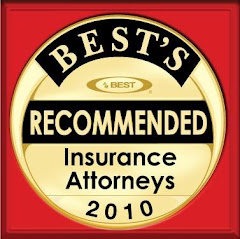The trend nationally is to prohibit the use of cell phones in motor vehicles. Such a ban would make use of a cellphone while working a deviation from employment and accidents involving cell phone use at work would then be considered a deviation from employment and excluded from
workers' compensation coverage,
Citing cell phone usage while driving, the Federal Government is making a major initiative to get workers off cell phone while at work. U.S. Transportation Secretary
Ray LaHood today announced the agenda for the second national Distracted Driving Summit to be held on September 21st , 2010 in Washington, DC.
Building on the success of last year’s summit, Secretary LaHood will convene leading transportation officials, safety advocates, law enforcement, industry representatives, researchers and victims affected by distraction-related crashes to address challenges and identify opportunities for national anti-distracted driving efforts. U.S. Labor Secretary Hilda Solis, U.S. Senator
Jay Rockefeller and U.S. Senator Amy Klobuchar will also speak at the summit.
“Thousands of people are killed or injured every year in accidents caused by distracted drivers,” said Secretary LaHood. “One year after our first national Distracted Driving Summit, we will reconvene to take stock of our progress and reassess the challenges and opportunities that lie ahead. I look forward to hearing insights from our distinguished panelists and guests, and know that by working together, we will save lives.”
The 2010 Distracted Driving Summit will be live webcast at
www.distraction.gov, enabling the participation of people around the country. US employers are urged to set policies to prohibit the use of cell phones at work. "Use a variety of organizational channels to communicate with employees the company's commitment to safety and health and specifically to the nonuse of cell phones and texting. Make it clear to your employees that the expectation is that they will NOT talk or text on their cell phones while driving on company time or in company vehicles. Have employees sign a contract that says they will not violate the organization’s ban on texting and driving."
Many
State Laws already ban the use of cell phones while driving.
Sample legislation to be used as a starting point for states crafting new laws to prohibit
texting while driving has been encouraged.
Making the workplace safer is a major purpose of workers' compensation law. Public policy will certainly support the effort to end distracted driving. The trend to exclude coverage for distracted driving is a signifiant move in the right direction to help workers steer clear of accidents.






